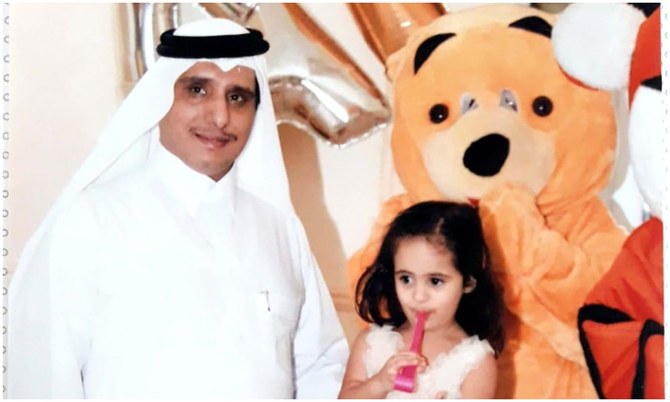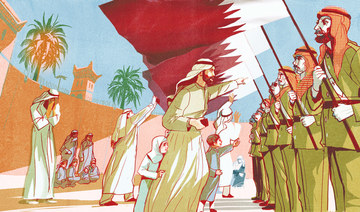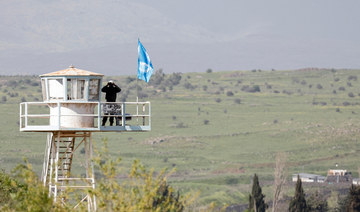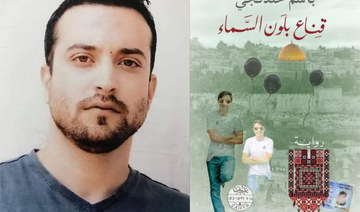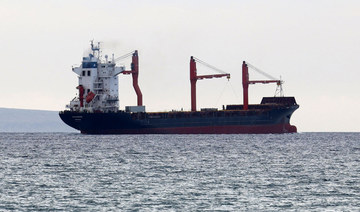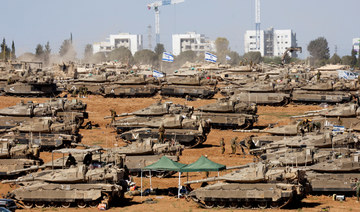RIYADH: Sheikh Talal Al-Thani, a senior member of the Qatari royal family, has been imprisoned in violation of his fundamental rights by Qatari authorities since February 2013. During this period, he has been allowed to see his wife Asma Arian and his four children — currently living in exile in Germany — only twice.
Sheikh Talal is the grandson of the late Qatari Emir Sheikh Ahmad bin Ali Al-Thani, whose reign lasted from 1960 to 1972. Sheikh Ahmad was deposed by his cousin Sheikh Khalifa bin Hamad, grandfather of Tamim bin Hamad, Qatar’s current emir, and father of former Emir Hamad bin Khalifa.
Tensions between family members escalated following the death of one of Qatar’s founders, Sheikh Abdul Aziz bin Ahmed, after his exile in Saudi Arabia in 2008. Shortly afterwards, Sheikh Talal’s assets were frozen and the inheritance he was due to receive after his father’s death withheld.
Since his arrest, which happened without a court order, Sheikh Talal has been frequently denied legal representation, family visits and medical care.
In May 2018, Sheikh Talal was sentenced by a Qatari court to more than 22 years. The prison term contradicts Qatar’s basic obligation to the International Covenant on Civil and Political Rights. Also, in violation of Sheikh Talal’s fundamental rights, his case has not been reviewed by an independent court.
Owing to the poor conditions in which he has been kept, Sheikh Talal today suffers from diabetes, loss of teeth, hypertension, pain in the back and joints and limited mobility.
He needs to be moved to hospital but is instead in a prison without access to medical care. The situation is compounded by Qatar’s refusal to test prisoners for COVID-19, even though the official claim is that “detainees have free healthcare in prison.”
Asma Arian, who married Sheikh Talal in 2007, spoke to Arab News from Germany on her uphill battle to make sure justice is done.
Q: Is it true that your appeal to the United Nations Human Rights Council got accepted?
A: It is true. We have made four appeals so far to the UNHRC. However, due to the coronavirus pandemic, they were stalled for a while, so the Office of the United Nations High Commissioner for Human Rights (OHCHR) appealed on my behalf to the UNHRC as part of the annual review of Qatar’s rights record and its obligations.
Qatar constantly claims that it respects its commitments to human rights. The UN has now endorsed four appeals from me. The first is on behalf of myself and the children at the highest possible level.
The other three appeals were presented to special committees for torture, arbitrary detention of my husband, and corruption of the judiciary.
The UN bodies are due to take a decision and we are in active contact with them. They have assured us that they have accepted the appeal and that, by next September 21, the issues related to this matter will be clarified.

Sheikh Talal has developed poor health and limited mobility due to the poor conditions in which he has been kept. (Supplied)
Q: What are your expectations with regard to handling of the case by the UNHRC?
A: Since the beginning of our correspondence, the UNHRC is convinced that the case as well as the documents provided by me prove Qatar’s violation of human rights in various areas. These include violations of the “Basic Principles for the Treatment of Prisoners” charter: torturing Sheikh Talal Al-Thani, preventing him from contacting his lawyer and detaining him without a valid reason, in addition to violating children’s rights (by preventing Sheikh Talal’s children from getting in contact with their father), and violating women’s rights by preventing me from getting in contact with him.
In the beginning, we used kind words in dealing with the Qatari government in asking for the release of Sheikh Talal, given that the documents prove that he had been wronged. We communicated with Qatari prisons to find out the reasons for his detention. However, there was no answer from Qatari authorities.
After pressure mounted on them, Qatari authorities released Sheikh Talal for a week before arresting him again in the expectation of a freeze or waiver of the cases and appeals from me. The brief release was a form of deception on the part of the Qatari authorities.
As to what I expect from the UNHRC, of course they have mechanisms, and we have reached a point where the case has gained importance at the UN level. It is possible to win the case as it is a humanitarian, not political, one, with multiple dimensions — children’s rights, women’s rights, prisoners’ rights and torture in prison — that expose Qatar’s flouting of human-rights treaties in general.
As of today, Qatar is violating these treaties. Our children are forbidden from communicating with their father, and I have been forbidden from contacting the lawyer defending him since we launched our appeal to the UN. I have told the UNHRC that as a country that does not respect even its own laws, Qatar cannot be expected to respect international laws.
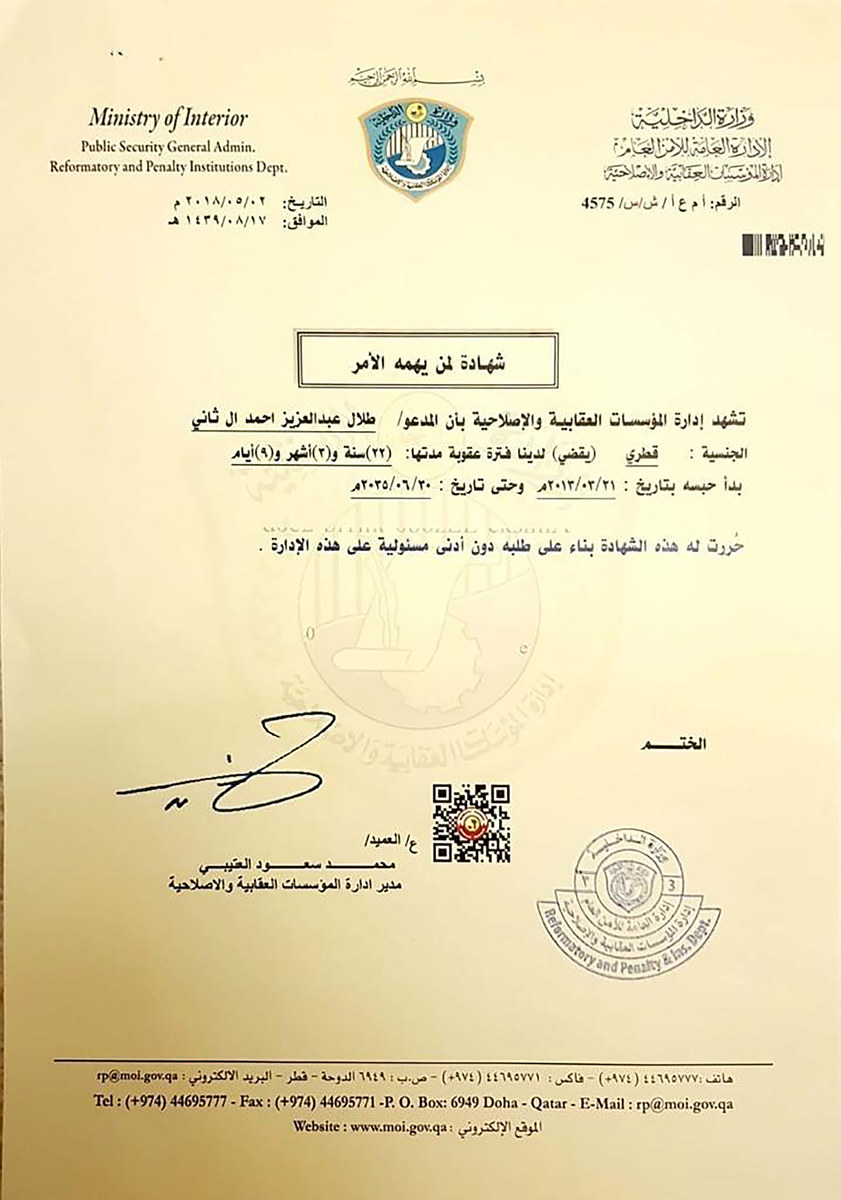
Letter from the Qatari Ministry of Interior’s Reformatory and Penalty Institutions Department stating that “Qatari Talal bin Abdulaziz Ahmed Al-Thani” had been sentenced for more than 22 years in jail. (Supplied)
Q: Sheikh Talal was released for a short period before being arrested again. Why did this happen?
A: This is how Qatar behaves: it cannot be trusted. We do not know why he was back in prison after he was released, nor where they took him to after blockading the house where he was detained. One can never be safe from this kind of official Qatari behavior.
He was released and put under house arrest, and when they wanted him back in prison, they laid siege to the house for eight hours. They were already monitoring the house, so what was the need for the siege that lasted for so long?
Are the psychological mistreatment and intimidation of Sheikh Talal since his arrest till now not enough? Are they expecting me to give up my husband and my children’s rights?
I will not give up, for they have not respected the most basic prisoner’s right, which is to allow him to communicate with his lawyer. How can I even agree to talk to them?
Q: Have you been asked by Qatari authorities to give up your campaign and appeals to international organizations?
A: This has been happening through messages sent via Sheikh Talal’s family members or directly to me to stop claiming his rights. But what is the use of being silent especially since the matter is limited to not just his condition. There are four children affected by this case and they do not know their father except through pictures.
******
READ MORE: Wife of Sheikh Talal Al-Thani accuses Qatar of torturing husband
******
Q: How many children does Sheikh Talal have?
A: Four children whose names are Alanoud, Aljawharah, Abdullah and Ahmed. The children are suffering owing to their displacement from their country and being away from their father. For example, Ahmed was born while Sheikh Talal was in prison. In addition, his children suffer as they are deprived of both their rights and those of their father.
All this suffering is caused by Sheikh Hamad bin Khalifa Al-Thani, the former Emir of Qatar. As long as this person is in Doha, Sheikh Talal is not safe, and this is what I told the UNHRC. It is possible that I will win the case at the UN and Qatar will be indicted. However, as long as Sheikh Hamad is in Qatar, I do not expect that Sheikh Talal will be released.

Sheikh Talal's son Ahmad has developed an allergy due to the lack of air-conditioning in his accommodation. (Supplied)
Q: The case against Sheikh Talal is financial in nature. Is the allegation true? What is the real reason behind his detention?
A: Qatar filed a lawsuit against Sheikh Talal because of debt which resulted from security cheques related to his own companies. The lawsuit included 1,600 documents related to the financial case only.
The UN was wondering why Sheikh Talal would be put in prison over a financial issue, so I told them that he was neither a killer nor a violator, nor did he commit a crime deserving of a life sentence of 22 years. He will die and not get to see his children.
Hence, the case is not financial. Maybe there is a grudge against Sheikh Talal, for prior to his imprisonment he had claimed his rights and his inheritance. Qatari law and the international law do not say that a person under debt should be put in prison for 22 years. Worse, he was imprisoned without having the right to contact a lawyer.
The judge even asked me if I had enough money to pay off the debt, so I presented to him a land ownership deed belonging to Sheikh Talal and said that the value of this land can pay off the debt and more. Then the judge raised his finger and said: “People on top are the ones to decide whether he will be released or not from prison.”
We know that the case is not a financial one to be paid off. However, we reply in accordance with their allegations. Now the state has confiscated the properties of Sheikh Talal, and state enterprises are using them without his permission or authorization.
I have been calling the police to intervene against the state enterprises that are using his properties, for they are holding his properties and depriving his children of financial gain and allowances, in addition to trespassing on his land without permission or paying him in return for benefiting from his properties.
******
READ MORE: “The Unforgiven”: Qatar’s Al-Ghufran tribe fights for justice — and right to citizenship
******
Q: Have they tried to settle the financial case with you?
A: Yes, it happened. I filed four cases related to the inheritance of Sheikh Abdul Aziz Al-Thani, Sheikh Talal’s father, who died away from Qatar. These cases prove that Sheikh Abdul Aziz had big inheritance and properties, and that Sheikh Talal’s share is substantial.
I told the judge to take all the farms and release Sheikh Talal. I even told them in the last communication: Take everything, and if Sheikh Hamad wants the farms let him take them, and if he wants to take everything, then let him. But to rob him of normal life, and deprive his children and torture them alongside him and displace them, this is not your right.
Q: Since when is Sheikh Talal in prison?
A: Since 2013, at the end of Sheikh Hamad’s reign, before he abdicated in favor of his son, Sheikh Tamim. In addition, the verdict against Sheikh Talal and his imprisonment was also during the reign of Sheikh Hamad.
He was put in prison because of a cheque. The cheque was not valid. An Egyptian judge, Mohammed El-Minshawi, ordered Sheikh Talal’s release but his decision was not implemented. I do not know if this judge is still in Qatar.
Q: How many times have Sheikh Talal’s children been able to visit him?
A: His daughter Alanoud was the only one to see her father twice in seven years. As for the other children, they only know their father through pictures.

The request made by Sheikh Hassan bin Khalid Al-Thani for electricity and water connection for a property registered for housing Talal Al-Thani’s children and their mother in Al-Wakrah. (Supplied)
Q: How is the health of Sheikh Talal?
A: His psychological and physical state is not fine. I was able to get a picture of him before he was back to prison. He looked very thin and appeared to have lost a lot of weight. I would not have wanted this picture to be published but for his health condition.
He suffers from diabetes at a time Qatar has experienced high numbers of coronavirus cases, especially in prisons. I fear for his life (eyes tearing up). I asked him: “Are they starving you? He said: “Yes, they are starving me.”
I could not imagine this happening in Qatar but after I saw the picture, I believed his words. I wonder how prisoners are fed, especially a prisoner who is suffering from diabetes and has already been operated twice in prison — the first time in his eye, the second time in his leg.
Q: Do you expect Sheikh Talal to be freed if Qatar is indicted for violating human rights in the cases relating to him and his children?
A: I expect an indictment by the UNHRC, but I do not expect Sheikh Talal to be released. However, I am convinced that I can prove to the world the shocking human-rights violations being committed by Qatari authorities. The international pressure they are feeling is a result of these rights violations. For a person of his nature, Sheikh Talal has been wronged in unimaginable ways.
Q: Do you intend to take further steps at the UN and the UNHRC?
A: I will pursue any legal procedure that serves to protect Sheikh Talal and his children from this injustice. Now I intend to file a lawsuit before the German judiciary against Qatar. This is something highly important to me, and I have started to take some steps in this regard. However, due to the COVID-19 pandemic I stopped.
Now, as life is back to normal, I will continue the lawsuit especially for I endured damage after they pursued me in Geneva and even crashed into my car. Now I am under the protection of the German police as I have accused Qatar and its media of many violations.
Q: Have you received explicit threats from Qatar?
A: I received threats when I was at Le Club Suisse de la Presse (the Swiss Press Club) in Geneva. They were waiting for me outside and sent people to threaten me and accuse me of spying. The last threat was a week ago when they released Sheikh Talal from prison.
They told me if I do not remain silent, they will put him back in prison, and this is what really happened. I really fear these threats. You cannot imagine what my psychological condition was when I decided to continue defending my husband and children’s rights. I feared that my husband would be liquidated and that I would be the cause of it.
Q: What is your message to international human rights organizations via Arab News?
A: I want to ask them to take my case seriously and remember that Qatar is not above the law. Had Qatar been respecting international human rights, it would have respected the charter of prisoners’ rights.
If Qatar claims that it respects human rights, then let it respect children’s rights and allow Sheikh Talal’s children to get in touch with their father at least via telephone once or twice per week. In addition, I ask the international organizations to intervene and mobilize their mechanisms.
Qatar is not above the law, and this is the right moment for them to mobilize to restore the rights of the prisoner, the child and the woman. I hope that pressure will be brought to bear on Qatar to release Sheikh Talal.
------------
Twitter: @md_sulami



